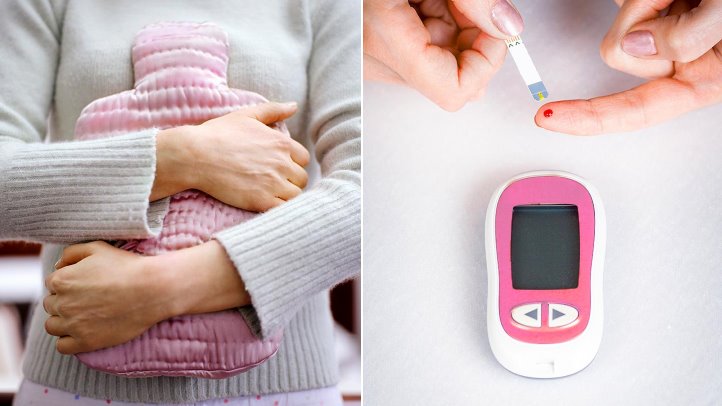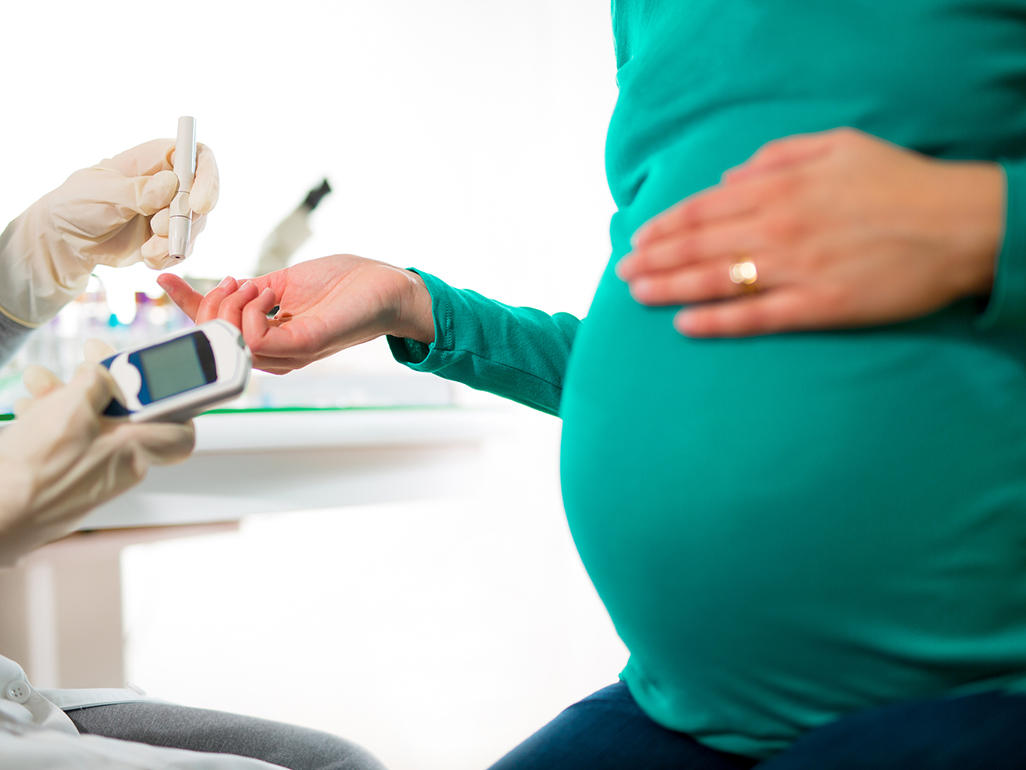Depression in early pregnancy more than doubles the risk of gestational diabetes, which, in turn, increases risk of postpartum depression six weeks after giving birth, says a study.Gestational diabetes is a form of diabetes occurring only in pregnancy and, if untreated, may cause serious health problems for mother and infant.
"Our data suggest that depression and gestational diabetes may occur together," said study first author Stefanie Hinkle from US National Institutes of Health's Eunice Kennedy Shriver National Institute of Child Health and Human Development (NICHD).
"Until we learn more, physicians may want to consider observing pregnant women with depressive symptoms for signs of gestational diabetes. They also may want to monitor women who have had gestational diabetes for signs of postpartum depression," Hinkle noted.
Although obesity is known to increase the risk for gestational diabetes, the likelihood of gestational diabetes was higher for non-obese women reporting depression than for obese women with depression, the study found.
The researchers analysed pregnancy records from the NICHD Fetal Growth Studies-Singleton Cohort, which tracked the progress of thousands of pregnancies, to understand the patterns of fetal growth.
The study enrolled 2,334 non-obese and 468 obese women in weeks eight to 13 of pregnancy.
The women responded to questionnaires on symptoms of depression when they enrolled in the study, again between the 16th and 22nd week of pregnancy, and then six weeks after giving birth.
The researchers found that women who had the highest scores for depression in the first and second trimesters -- about 17 percent -- had nearly triple the risk for gestational diabetes when compared to women who had lower depression scores.
Of the women who developed gestational diabetes, nearly 15 percent experienced depressive symptoms after birth, which was more than four times that of women who had not had gestational diabetes, showed the study published online in the journal Diabetologia.
The researchers believe that high blood sugar levels may lead to inflammation, hormonal, and other changes that could lead to symptoms of depression.
Women with vitamin B12 deficiency during pregnancy may predispose their children to metabolic diseases such as Type-2 diabetes, a team of researchers led by one of Indian origin has warned.
The vitamin is found in animal products, including fish, meat, poultry, eggs and milk.
Its deficiency are more likely to occur in pregnant women, who follow a vegetarian diet, the study said.
"The nutritional environment provided by the mother can permanently programme the baby's health," said Ponusammy Saravanan, Associate Clinical Professor at the University of Warwick in Britain.
In this study, researchers hypothesised that the changes associated with B12 deficiency may be the result of abnormal levels of leptin - the hormone that tells us we are full after eating.
"Maternal B12 deficiency may affect fat metabolism and contribute to this risk. This is why we decided to investigate leptin, the fat cell hormone," Saravanan added.
Leptin is produced by human body's fat cells and its levels rise in response to eating food.
While lean diets are associated with normal levels of leptin, obesity causes levels to rise and remain consistently higher than normal.
This can eventually lead to leptin resistance, continued overeating, and an increased risk of insulin resistance, which leads to Type-2 diabetes, the researchers observed, adding that leptin can provide an effective 'marker' for body fat.
The study showed that babies born to mothers with B12 deficiency had higher than normal leptin levels.
This suggests that maternal B12 deficiency can adversely programme the leptin gene, changing the levels at which the hormone is produced while the foetus grows.
"The leptin can increase for two reasons. Either low B12 drives fat accumulation in the foetus, and this leads to increased leptin, or the low B12 actually causes chemical changes in the placental genes that produce leptin, making more of the hormone," explained Adaikala Antonysunil from University of Warwick.
The study was presented at the Society for Endocrinology's annual Conference in Brighton.
Pregnant women who are particularly vulnerable to iron deficiency, may also be at risk if iron is found in excess in their bodies. They are likely to develop gestational diabetes, a study has found.
As a strong pro-oxidant, free iron can promote several cellular reactions that generate reactive oxygen species and increase the level of oxidative stress.
Oxidative stress induced from excess iron accumulation can cause damage to and death of pancreatic beta cells which produce insulin, and consequently, contribute to impaired insulin synthesis and secretion.
In the liver, high iron stores may induce insulin resistance via impaired insulin signalling as well as by limiting the capacity of the liver to extract insulin, the researchers said.
"Higher maternal iron stores may play a role in the development of gestational diabetes starting as early as the first trimester," said Cuilin Zhang from Eunice Kennedy Shriver National Institute of Child Health and Human Development (NICHD), in the US.
In the study, the researchers looked at several biomarkers of iron status, including plasma hepcidin, ferritin, and soluble transferrin receptor (sTfR), in 107 gestational diabetes cases and 214 controls.
They found that in the second trimester of pregnancy, those in the top 25 per cent of levels of hepcidin and ferritin had around a 2.5 times increased subsequent risk of developing gestational diabetes compared with those in the bottom 25 per cent.
In additon, a possible link between higher iron stores and abnormal blood sugar control, including Type 2 diabetes, in non-pregnant individuals, was also found.
"These findings raise potential concerns about the recommendation of routine iron supplementation among pregnant women who already have sufficient iron," Zhang noted, in the paper published in the journal Diabetologia.
An AIIMS study has claimed that women suffering from polycystic ovary syndrome (PCOS), a condition of hormonal imbalance, are more likely to be affected by diabetes.
Notably, the polycystic ovary syndrome has taken epidemic proportions in the country affecting around 23 per cent women.
The study by Dr Mohammad Ashraf Ganie, Associate Professor, Department of Endocrinology and Metabolism, AIIMS, was published in American Society of Reproductive Medicine Journal (Fertility sterility) in July.
During the study, 2,047 women from Delhi and Jammu and Kashmir, suffering from polycystic ovary syndrome, were screened.
"Polycystic ovary syndrome can cause irregular periods, unwanted hair growth, and glucose intolerance due to hormone imbalance," Dr Ganie said.
"Out of the 2,047 women, 36 per cent, aged between 14 to 40 years, were found to be suffering from pre-diabetes and diabetes. These women have central obesity. They have high levels of insulin and male hormone due to sedentary lifestyle, consumption of high-calorie diet and genetic tendency," he said.
"Insulin resistance, a condition in which the body produces insulin but does not use it effectively, has been recognised as a risk factor for diabetes," Dr Ganie said.
According to World Health Organisation (WHO), an estimated 3.4 million deaths are caused due to high blood sugar, 80 per cent of which occur in low and middle-income countries.
According to Diabetes Atlas-2015 by the International Diabetes Federation (IDF), 69.1 million people are affected with diabetes in India, the second highest after China, which has 109 million people with diabetes.
By 2030, the number of diabetes patients in the country is likely to rise to 101 million, an estimate by the World Health Organisation (WHO) claims.
Pregnant women with pregnancy-related diabetes are less likely to achieve blood sugar control if they rely on food stamps or have a generally chaotic lifestyle, according to a U.S. study.
These kinds of factors may be modifiable, the authors write in Obstetrics and Gynecology.
“Many social factors have a major impact on overall pregnancy health,” said Dr. Laura Colicchia, who led the study at the University of Pittsburgh and is currently in Maternal-Fetal Medicine at Abbott Northwestern Hospital in Minneapolis.
About 200,000 U.S. women develop diabetes during pregnancy each year, Colicchia said, and they must follow a strict diet, prick their fingers four times daily to check blood sugar, report their blood sugars to the doctor weekly, have frequent office visits and ultrasounds, and in many cases take insulin or medications several times daily to control their sugars.
“Gestational diabetes impacts every aspect of a woman's life including eating with and cooking for her family, scheduling her blood sugar checks and meals at work, where she obtains the food to follow the diet and how she creates time for everything,” she said.
“Because of this, barriers to management of diabetes can come from any part of her life including her family, her neighborhood, her daily routine or her employer,” she told Reuters Health by email.
Women who are obese, have limited access to food or are from marginalized communities are at higher risk for gestational diabetes and often have higher blood sugar levels when diabetes is diagnosed making it harder to control, Colicchia noted.
The researchers surveyed 111 women with gestational diabetes at clinical visits, using questionnaires designed to measure social support and degree of life “chaos,” which includes organization, stability and the ability to plan and prepare for the future.
They later analyzed medical records for blood sugar control and pregnancy outcomes, including infant size, maternal weight gain, cesarean delivery and newborn health.
Women were rated as having good blood sugar control if at least 70 percent of their blood sugar assessments were at goal level or better.
Overall, 86 of the 111 women achieved good glycemic control, either by diet changes alone or with the help of medication and insulin treatment. These women were more likely to be married, have higher household income and exercise three times a week, and less likely to have public insurance or a history of depression or anxiety.
In general, food access and social support were not related to blood sugar control, though women receiving Supplemental Nutrition Assistance Program (SNAP) benefits tended to have worse blood sugar control.
Women with poor blood sugar control had higher scores on the chaotic lifestyle scale than those with good control, the authors also found.
“Women are not always able to change many things that make life chaotic such as unstable housing, unpredictable work schedules, poverty and family stressors,” Colicchia said. “However, the gestational diabetes regimen in many cases can be adjusted to accommodate some of these factors, such as adjusting mealtimes or medication times to the woman's new schedule, or giving suggestions for healthy meals that can be eaten on the go or can be cooked ahead.”
Women who lack material resources and live amidst hubbub and chaos brought on by caring for children and working and the absence of a partner may have more trouble controlling their blood sugar, said Nancy Ross of McGill University in Montreal who was not involved in the study.
“It seems like these women need help to lessen the ‘hubbub and chaos’ - perhaps shorter working hours, some breaks from caring for children to focus on shopping and meal preparation and having time to exercise,” Ross said by email.
Doctors should ask women about the social factors relevant to diabetes care, and women should be honest with their doctors about the limitations they face, Colicchia said. ‘
“If doctors and nutritionists know in advance that a woman will not be able to eat breakfast because she has to get her kids on the bus, or that her employer won't let her check her sugar after lunch we can make suggestions and adjustments to accommodate some of these factors,” she said.











